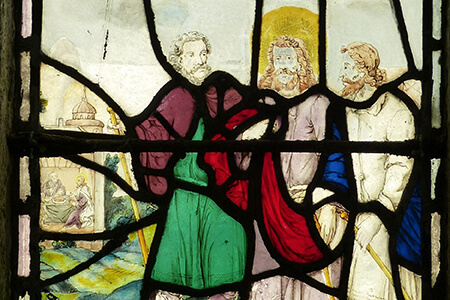 Acts 2:14, 22-33
Acts 2:14, 22-33
 1 Peter 1:17-21
1 Peter 1:17-21
 Luke 24:13-35
Luke 24:13-35
The readings on this third Sunday of Easter take us on a spiritual roller-coaster ride; one that compels us to take courage and plunge into the deepest and darkest chamber of our heart, so that we may experience the exhilaration of being raised all the way to the top where the fullness of God’s love awaits. That plunge, or leap of faith, is always a choice for each one of us. Are we willing to let go of our human instincts and place our trust in the unfailing hands of our Heavenly Father?
When we go through rough patches of our life, experience extraordinary challenges or significant loss, our human instincts of fight or flight immediately kick in. Some may continue to put up a good fight while others may choose to throw in the towel. When one is overcome by grief or anger, it is hard to imagine that there is a way out of that bottomless pit of pain. In this week’s Gospel, Luke tells us the roller-coaster adventure of the two disciples on the road to Emmaus, who after experiencing what feels like to them a complete defeat in Jerusalem, decide to leave their troubles behind - they choose flight over fight. One can easily imagine the range of emotions that they might have gone through: grief, anger, fear, loss, and despair. Jesus of Nazareth, someone in whom they have “hoped that he was the one to redeem Israel”, has been “condemned to death and crucified” (Lk 24:20-21). Even though they have also been told about the women’s encounter of the “Angels who said that [Jesus] was alive”, they still cannot bear to remain in Jerusalem (Lk 24:23). These disciples must be feeling pretty downtrodden. What compels them to leave? From what are they running away? Perhaps fear - fear of authorities who may come after them; or grief - their hearts are broken by losing someone dear to them; perhaps hopelessness - they figure that there’s nothing more they can possibly do; or despair - the anchor of their lives is gone and their hearts have become unravelled; perhaps shame - they have not done anything to defend or help Jesus.
When Jesus appears to the two disciples on their journey, “their eyes were kept from recognizing him” (Lk 24:16). Jesus’ comment about how “foolish” they are is by no means demeaning, rather Jesus, recognizing their “slow of heart”, wants to take this opportunity to open their eyes and heal their heavy hearts (Lk 24:25). Jesus begins to interpret “to them the things about himself in all the Scriptures” (Lk 24:27). Their eyes and hearts are finally open in the breaking of the bread. Amazed, they said to each other, “Were not our hearts burning within us while he was talking to us on the road, while he was opening the Scriptures to us” (Lk 24:32)?
The story does not end at the meal. Within the hour, the disciples “got up and returned to Jerusalem” so that they may bear witness to the risen Lord (Lk 24:33). When Jesus opens their eyes and heals their hearts, their spirits are renewed! Jesus has shown them the “path of life” (Ps 16:11) - Jesus is “the way, the truth, and the life” (Jn 14:6). Through the resurrected Christ, their trust in God is resuscitated, “through him you have come to trust in God” (1Pet 1:21). Their journey back to Jerusalem, contrary to their departure, would have been filled with joy and hope. With reluctance, the disciples descend into a place of loss, anger, grief, and despair. With joy, they have been lifted up to the mountain top where they encounter the glory of God, Christ resurrected and breaking bread with them!
The disciples’ walk to Emmaus has ended here; however, our own walk to Emmaus has just begun. Each one of us must walk down this path which may be littered with obstacles and challenges; however, we are not walking alone but with each other and our teacher, Jesus Christ. During this Easter season, may we take courage to take this journey with Christ; with joy and hope, and place our trust in the palms of God’s hands. When we feel tired and hungry, do not fret; return to the Bread of Life - the Eucharist - and be nourished.
